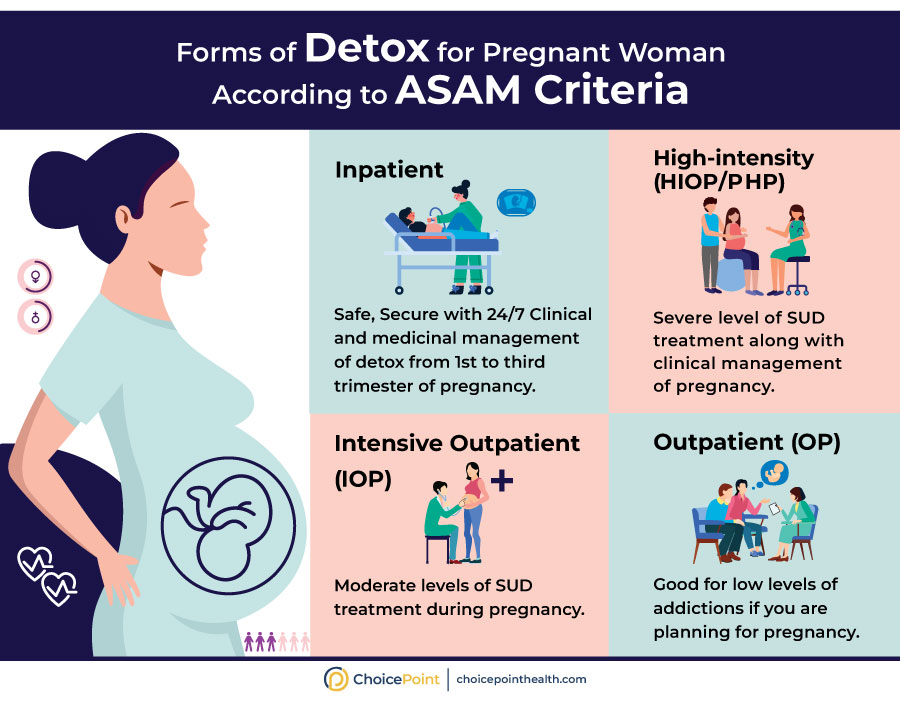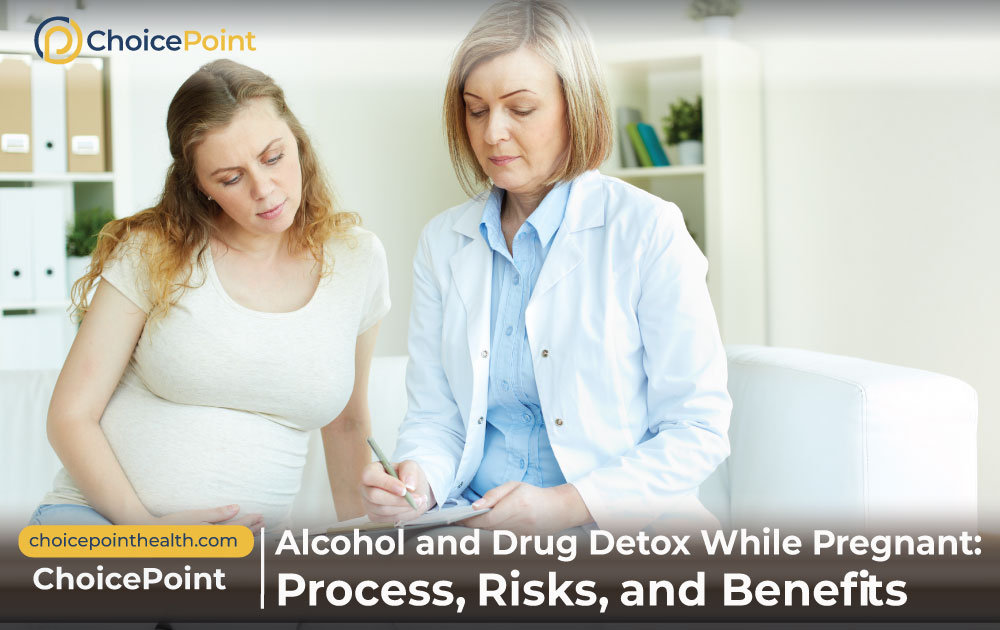Women are at the highest risk of getting substance use disorder during their pregnancy due to consistent hormonal changes and mood swings. It is common for women to use substances like alcohol, fentanyl, benzos, heroin, cocaine, and meth during pregnancy. Quitting these substances or administering detox while pregnant becomes a huge burden for women due to substantial systematic and cultural barriers.
ChoicePoint’s personalized treatment program for expecting mothers provides a safe detox of substance use while managing pregnancy. Call Now 844.445.2563 to discuss your appointment!
Table of Contents
Importance of Detox for Pregnant Women
Pregnancy often comes as a surprise for most women while they are addicted to one or two substances. Addiction is a chronic disease that can affect a pregnant woman’s physical and psychological well-being. The importance of detox can be realized by
- Addiction harms anyone at any time, regardless of the nature and severity of dependence.
- Substance use dependency may worsen the situation for people with mental illness as it worsens the withdrawal symptoms and alters brain receptors.
- A safe trajectory from substance use disorder to maintaining a healthy pregnancy is only possible with a medically managed detox for pregnant mothers.
- Detoxification is the first step towards achieving a healthy life for the mother and baby struggling with toxicity in the body fluids.
- Detox involves safely withdrawing substances from the body while managing prenatal care and hormonal changes that may persist due to substance dependence.
- Most of the women don’t go for detox due to the stigma and shame associated with it. But with professional guidance and care, one can get it reduced.
The best way to ensure a safe and catered detox while pregnant is to consult a professional who specializes in treating expecting mothers out of their addiction ordeal.
Effects of Drug and Alcohol Use During Pregnancy
Substance use disorder increases the chances of pregnancy-related complications such as:
- Stillbirth
- Fetal alcohol syndrome (FAS)
- Neonatal abstinence syndrome (NAS)
- Miscarriage
- Developmental defects
- Premature birth
- Withdrawal symptoms at birth
- Neurological and cognitive disorders after birth for the baby
Alcohol, with some exceptions, causes the most long-term side effects, with intellectual disabilities and FAS being the severe ones. Substance use can harm both the baby and mother and can cause the majority of pregnancy-related deaths. The only way out of this dilemma of complexities is a professionally managed detox administered at a rehab facility.
How Can You Detox While Pregnant
Before entering into detox, it is pertinent to acknowledge the mentioned steps that are performed during detox to get an insight into the detox and rehab process for complete sobriety.
“We have been through everything together. We have been through everything,” said Mollie Ogle,
A former expecting mother going through detox.
Medical Examination
Before beginning detox, practitioners must thoroughly examine where they will perform.
- Blood testing
- Drug and alcohol screening
- Addiction assessment
- Physical and psychological checkup
- Dual Diagnosis for comorbid condition, i.e., mental illness and substance use disorder
- Pregnancy assessment
The medical examination is vital for evaluating the mother and baby’s health before administering medications of detox. It also allows practitioners to adjust detox plans according to the severity of the substance use disorder and the complexity of pregnancy.
Prenatal Care
After careful evaluation, prenatal care is the utmost step in detox, where the following steps are taken to ensure pregnancy and baby’s safety:
- Management of folic acid Vitamin B9 intake
- Healthy diet for nutritional balance
- Monitoring substance use effects on fetus growth
- Medication safety to ensure baby’s protection from medicinal harm
Such prenatal care modules are only possible if the rehab has addiction specialists experienced in providing personalized care for the expecting mother’s addiction treatment.
Addiction Education Through Counseling
As the detox starts, practitioners and addiction counselors educate pregnant mothers about the consequences of a substance use disorder, its effect on the baby’s growth, and the importance of sobriety for maintaining a healthy pregnancy. During addiction education, they may administer some therapies such as:
- Individual therapy to address personal issues and acknowledge the flaws of SUD with pregnancy
- Group therapy to reduce stigma and realize the importance of sobriety
- Family therapy to revitalize personal relationships that lead to trauma and substance use.
Education about substance use disorder and realization of the gravity of the issue is necessary for expecting mothers because detox can be burdensome and often fearful for some as it comes with many complications if not professionally governed.
Medication-Assisted Withdrawal Management
While detoxing, a woman will experience several unpleasant or even fatal withdrawal symptoms due to her body’s dependence on substance use. They include
- Nausea and vomiting
- Stomach upset
- Abdominal cramps
- Flu-like symptoms
Moreover, aforementioned syndromes such as (FAS), (NAS) also contribute to the side effects of substance use if detox is not carried out in proper time. To eliminate the possibility of distressing symptoms, detox may be accompanied by FDA-approved medications such as:
- Suboxone for general opioid withdrawal
- Subutex for prescription opioid withdrawal
- Buprenorphine for opioid and alcohol withdrawal
- Naltrexone for alcohol withdrawal
To get a same-day prescription for your addiction treatment for expecting mothers, Contact ChoicePoint 844.445.2563.

Levels of Maternal Care Suffering from Substance Abuse
Managing Risks of Detox While Pregnant
Detox can be difficult and comes with many risks that may become unmanageable if not carefully governed. They include:
Psychotherapy for Psychological Detox of Mental Illness
A majority of Women, around 56 to 92%, who are pregnant and are using alcohol or drugs often suffer from some sort of psychiatric illness. Comorbidity of substance use and mental illness is common in pregnant women due to sexual abuse. Some of the common mental illnesses that persist during detox are:
- Post-traumatic stress disorder due to an abusive relationship
- Postpartum depression after pregnancy
- psychosis
- Sudden mood swings due to hormonal imbalance
These conditions can make detox worse due to psychological withdrawal symptoms associated with substance dependence. For that, psychiatrist-oriented psychotherapy such as:
- Cognitive behavioral therapy (CBT) for improving negative behavior that leads to substance use and worsening mental illness.
- Dialectical behavior therapy (DBT) is for learning skills that curb over-heightened emotions.
Mental health plays a crucial role during detox. Psychotherapies can reduce the danger of risky psychotic illness and pave the way for a smooth detox.
Safety of the Fetus
During detox or substance use, everything a mother goes through, the baby has to experience it, too. There’s a high risk of sudden infant death syndrome (SIDS) due to hormonal imbalance and toxic substances of drugs or medication passing through the umbilical cord to the baby’s bloodstream. The only way out of this is a safe detox while maintaining pregnancy through consultation with practitioners and DEA-certified staff.
Continuing With Pregnancy
Even after detox has been completed, maintaining pregnancy and providing aftercare to prevent relapse is a crucial task. While maintaining the clinical procedure for pregnancy continuity at a hospital, the mother needs to get in touch with the remaining treatment modules of aftercare, including:
- Followup sessions
- Nutritional management for controlling cravings and relapse
- Relapse preventive therapy
- Counseling for mental illness management
Managing all these risks after detox will help to maintain a healthy pregnancy and a sober lifestyle for both the baby and the mother.
Benefits of Detox While Pregnant
Some of the positive aspects of going through a substance detox during pregnancy include:
- A healthy mother gives birth to a healthy baby full of blooming life
- There’s less risk of developing post-partum depression if proper counseling is administered during detox
- Sobriety helps maintain a healthy lifestyle that works in the development of the baby
- Improves sense of well-being and a mindset to care for the growing baby
- Promotes mental health state, which in turn balances hormonal changes that may disrupt pregnancy
- A better immune system responds to less disease-prone baby
The sole purpose of detox is sobriety, which has countless benefits one can only realize after achieving it.
Getting Addiction Help With Choicepoint Personalized Expecting Mother Care
Chociepoint’s personalized addiction treatment program is equipped with all the required modules for managing pregnancy and addiction treatment side by side. We have experts to cater to your needs for sober recovery and your baby’s health. We also offer versatile payment options such as:
- Tricare
- Medicare and Medicaid
- Commercial Insurance
- Personal funds
So verify your insurance and begin your recovery while expecting a healthy baby!
Frequently Asked Questions About Addiction and Pregnancy
Addiction and pregnancy may pose some questions in the mind of a woman, such as:
Is Detox Safe for Pregnant Women?
The safety of detox depends on how it is administered. Detox comes with significant complications and uneasy symptoms, so professional help and care are necessary to ensure safe and secure detox during pregnancy.
Can You Detox on Your Own While Pregnant?
NO! Going through detox on your own while managing the pain of pregnancy may result in severe consequences that could harm the baby and mother. A person is not able to adjust the dose of addiction medication and manage withdrawal symptoms on their own, so professional care is advised in every matter for addiction treatment.
Which Trimester is the Fetus Most Susceptible to Damage from Toxins?
During the first trimester of pregnancy, alcohol or drug use can cause severe developmental side effects to the baby as this is the most crucial stage of organ growth and physical development of a baby.
Is It Safe to Detox While Pregnant in the Third Trimester?
No! The third trimester usually begins after the 26th week of pregnancy, so detoxing can intervene with the baby’s neurological development and may cause stillbirth or miscarriage.
How Can I Detox My Liver While Pregnant?
The liver usually gets intoxicated due to excessive alcohol use. Alcohol rehab may dispense Naltrexone (Vivitrol) for liver catharsis.
How Long Does Detox Last During Pregnancy?
A detox should be administered at least 3 months before conceiving. Once the detox is completed, prenatal care is necessary to maintain and carry on a healthy pregnancy for the baby.
Medical Disclaimer:
ChoicePoint aims to improve the quality of life for people struggling with substance use disorder and mental health issues. Our team of licensed medical professionals research, edit and review the content before publishing. However, this information is not intended to be a substitute for professional medical advice, diagnosis, or treatment. For medical advice please consult your physicians or ChoicePoint's qualified staff.











Review Detox While Pregnant: Process, Risks, and Safe Beginnings with Alcohol and Drugs.